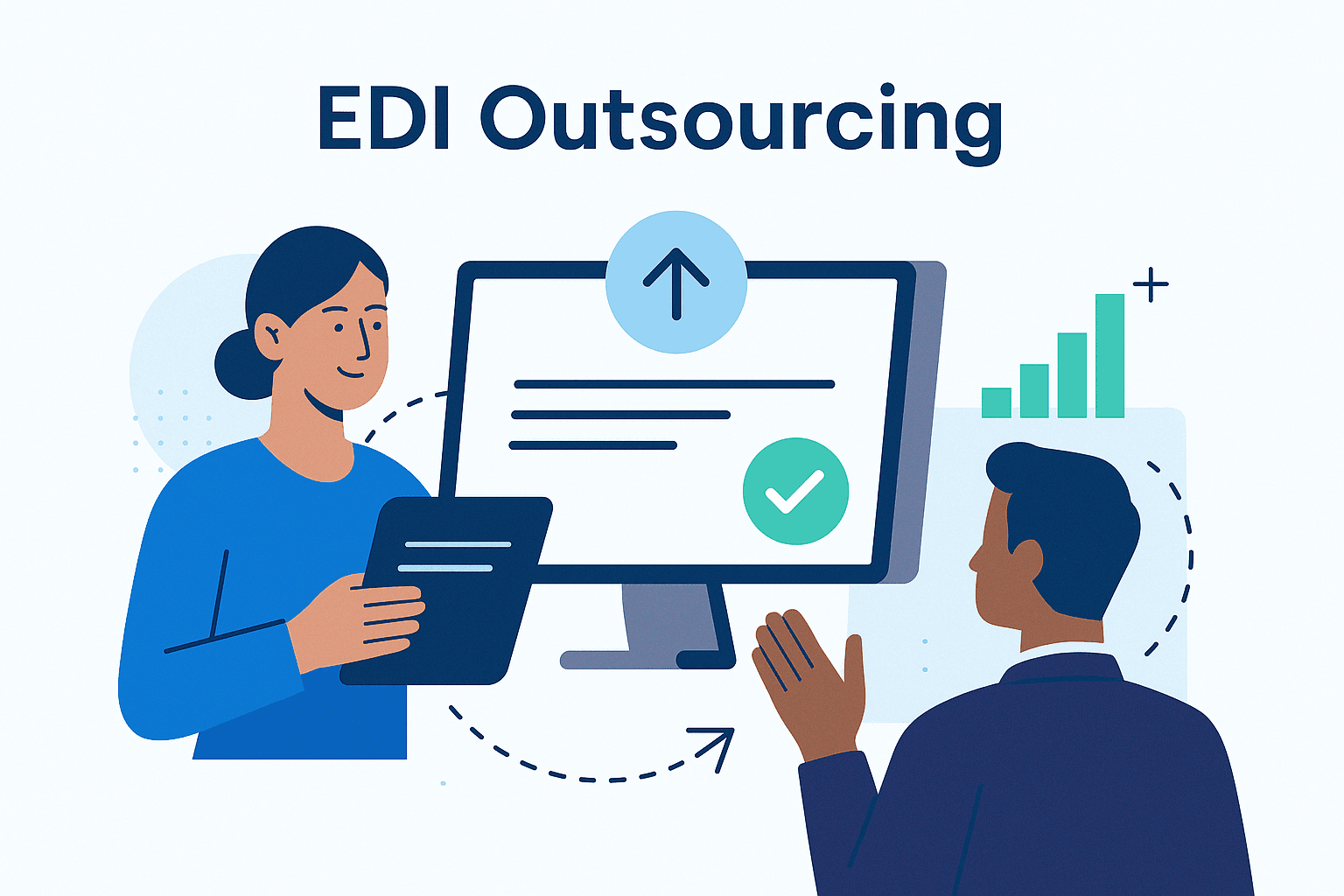Discover how EDI outsourcing can reduce costs, improve visibility, and help you scale. Learn when outsourcing works best and how to do it the right way.
Staying compliant in today’s supply chain ecosystem requires fast, reliable electronic data interchange (EDI), but many companies still rely on outdated, in-house EDI systems that can’t keep up with growing demands, delays, and rising support costs.
That’s why more organizations are exploring EDI outsourcing or a managed EDI service as a strategic alternative. A modern EDI provider can take on the technical heavy lifting without sacrificing visibility or complete control. Whether you're struggling with a new business system integration or trying to avoid the complexity of building your own solution, outsourcing gives your team the freedom to focus on your core business instead of scrambling to address transmission errors or slow trading partner onboarding.
What Is EDI Outsourcing?
EDI outsourcing refers to handing off some or all of your electronic data interchange responsibilities to a third-party provider. That provider facilitates key tasks like data mapping, EDI document formatting, connection testing, trading partner onboarding, and ongoing support. In most cases, this includes maintaining your company’s EDI system and managing the day-to-day complexity of handling EDI processes internally.
Traditionally, outsourcing meant giving up control or visibility in exchange for simplicity, but that’s no longer the case. Today’s cloud-native EDI outsourcing services offer real-time monitoring, API connectivity, and scalable architectures designed to meet modern business demands. With the right partner, companies can offload EDI-related tasks while still maintaining complete control over how data moves between systems.
Why Companies Are Rethinking EDI
Legacy EDI systems were built for a different time that involved fewer partners, slower change cycles, and more in-house infrastructure. Today, retailers, 3PLs, and suppliers are applying more pressure with stricter EDI integration requirements and quicker turnaround times. These mandates often surface after an ERP upgrade or as part of expanding to new sales channels.
Most in-house EDI operations aren’t built for this level of agility. Every new partner, format, or change request adds manual work and potential failure points. Data mismatches and compliance issues drain internal resources and make it more difficult to respond to growing business demands. As a result, many companies are moving away from static, internal systems toward modern, cloud-based EDI solutions that offer both automation and flexibility.
What Are the Options for EDI: In-House vs. Outsourced?
The old-style EDI platforms can end up costing you in both the short term and the long run. Organizations looking to modernize their EDI capabilities typically have three main paths forward:
In-house EDI: You maintain full control of the system but also take on all responsibility for setup, testing, compliance, and error handling. This often requires hiring dedicated EDI specialists and investing in infrastructure, driving up capital investment and ongoing costs.
Fully managed EDI service: A third-party provider manages the entire operation, including trading partner onboarding, document exchange, and support. While an outsourcing firm can reduce internal workload, it often comes with limited visibility, slow ticket-based support, and a higher risk of vendor lock-in.
Managed EDI with modern platforms: Newer solutions like Orderful combine the simplicity of outsourcing with the flexibility of in-house control. You get a fully outsourced EDI solution that includes API access, real-time monitoring, and pre-connected partner networks without giving up transparency or responsiveness. If cost savings is a high priority, consider this EDI model that balances price transparency with user control.
Each model has trade-offs, but modern managed EDI offers the most balanced approach for businesses that want to streamline operations without compromising on oversight or scalability.
How Modern EDI Outsourcing Compares to Other Models
Choosing the right EDI model often comes down to trade-offs in speed, flexibility, and control. Traditional systems offer more customization options but demand more time and resources. Outsourced solutions reduce internal burden but often create blind spots. Modern managed EDI platforms aim to bridge that gap.
The table below compares the key differences between in-house systems, traditional outsourcing, and cloud-native platforms like Orderful:
Feature | In-House EDI | Traditional Outsourcing | Managed EDI with Orderful |
Setup time | Months | Weeks | Days |
Internal resource load | High | Low | Low |
Flexibility | High | Low | High |
API access | Available but complex | Rare | Built-in |
Real-time visibility | Partial | Limited | Full |
Cost predictability | Variable | Variable + hidden fees | Transparent pricing |
Partner onboarding speed | Slow | Inconsistent | Fast and standardized |
Modern platforms like Orderful give you the reliability of managed EDI services with the kind of access and control you’d expect from an in-house solution, without the infrastructure expenses or vendor lock-in.
What Services and Benefits Come With EDI Outsourcing?
When you outsource EDI, you tap into an entire ecosystem of managed services designed to simplify and strengthen your supply chain operations. Modern EDI outsourcing services typically include:
Trading partner setup: Quickly connect with retail partners, suppliers, or 3PLs using standardized onboarding templates.
Document mapping and testing: Ensure accurate formatting of EDI documents like invoices, ASNs, and purchase orders.
Ongoing support: Resolve errors and connection issues faster with built-in monitoring and responsive service.
Compliance assistance: Stay current with trading partner EDI specs and evolving compliance requirements.
Real-time visibility: Monitor EDI transactions and status updates without relying on support tickets.
These services reduce the need for internal troubleshooting and manual intervention, freeing your team to focus on core business processes. With modern EDI outsourcing, you gain flexibility, scalability, and peace of mind.
By integrating platforms like Orderful with popular business systems like NetSuite and QuickBooks, you can maintain a connected, compliant, and future-ready operation with ease.
Is EDI Outsourcing Worth It? A Cost-Benefit Look
For many companies, the cost of building and maintaining an in-house EDI system can be surprisingly high. You’re not just paying an EDI vendor for software. You’re also investing in your own infrastructure, specialized personnel, compliance updates, and round-the-clock EDI support. When those systems fall behind, EDI costs can spike due to failed transactions, delays, or costly chargebacks.
Outsourcing the bulk of your EDI technology helps reduce many of those back-end expenses, especially when you choose a provider with transparent pricing and scalable service tiers. A modern managed service doesn’t just lower upfront investment. It also improves long-term ROI through:
Faster partner onboarding
Fewer data errors and retries
Streamlined compliance with evolving EDI requirements
Real-time visibility that reduces support tickets
When you factor in total cost of ownership (TCO), platforms like Orderful offer a predictable, cost-effective way to keep your supply chain compliant and connected, without the added complexity of internally managing EDI processes.
When and How to Outsource EDI Successfully
Knowing when to outsource EDI is just as important as choosing the right partner. You may be ready to outsource if:
Your team is spending more time troubleshooting EDI issues than growing the business
You’ve received updated EDI specs from business partners or 3PLs
Your current provider can't keep up
You need architecture that can easily scale and won’t stall during peak seasons
You’re looking for a cost-effective solution without a major investment
Whether you're a large enterprise or a fast-growing smaller brand, an experienced outsourcing firm can free your internal team from handling data translation and error resolution.
Look for an EDI service provider that offers:
Transparent monthly or annual subscription pricing
Real-time visibility into data exchange and EDI transactions
A strong track record of support and onboarding performance
Integration with your existing ERP or business system
Orderful is designed to help companies of all sizes get up and running with modern EDI faster, without the complexity or cost of building their own infrastructure from scratch.
Outsource EDI the Smart Way
Modern EDI outsourcing gives your team the best of both worlds — fewer internal responsibilities and more operational control. Instead of wrestling with outdated systems, you can partner with an EDI provider that delivers speed, transparency, and built-in expertise.
Whether you’re looking to scale or replace an in-house EDI setup that no longer fits your business, a fully managed EDI service like Orderful can help you streamline operations without sacrificing visibility or flexibility.
Stop managing your EDI technology manually. Talk to an expert and see how Orderful’s cloud-native platform can simplify your EDI processes.
Key Takeaways on EDI Outsourcing
EDI outsourcing lets you hand off complex tasks like data mapping, compliance, and onboarding.
Modern managed platforms like Orderful offer speed, visibility, and flexibility.
Choosing the right partner is essential to avoiding vendor lock-in and hidden costs.
With API connectivity, transparent pricing, and real-time monitoring, modern EDI solutions are no longer a compromise — they’re an upgrade.
FAQs About EDI Outsourcing
What is EDI outsourcing?
EDI outsourcing is the practice of hiring a third-party provider to manage your company’s electronic data interchange (EDI) processes, including partner onboarding, data formatting, and compliance.
Why do companies outsource EDI?
Companies outsource EDI to reduce internal complexity, improve trading partner performance, and avoid costly errors or infrastructure investments.
How does modern EDI outsourcing work?
Modern EDI outsourcing platforms use cloud-native tools, real-time visibility, and API integrations to manage your EDI tasks while maintaining user control.
Is EDI outsourcing a good idea for small or mid-size businesses?
EDI outsourcing is a smart option for small and mid-size businesses because it eliminates the need to hire EDI specialists or build infrastructure from scratch.
What’s the difference between EDI outsourcing and managed EDI?
Traditional EDI outsourcing hands off all operations to a third party. Managed EDI outsourcing still relies on an external provider, but is delivered through a modern platform with features that let the customer retain much of the control.
Can I outsource EDI without losing control or visibility?
Absolutely. With the right provider, you can maintain complete visibility into your EDI transactions, monitor performance, and control how your data flows, without managing the backend.
- 01What Is EDI Outsourcing?
- 02Why Companies Are Rethinking EDI
- 03What Are the Options for EDI: In-House vs. Outsourced?
- 04What Services and Benefits Come With EDI Outsourcing?
- 05Is EDI Outsourcing Worth It? A Cost-Benefit Look
- 06When and How to Outsource EDI Successfully
- 07Outsource EDI the Smart Way
- 08Key Takeaways on EDI Outsourcing
- 09FAQs About EDI Outsourcing

